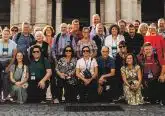Seek the Lord for March 2024
Catholics mark the beginning of the holy season of Lent with the reception of blessed ashes, acknowledging our sinfulness and the reality that one day we ourselves will return to dust. Over the course of these 40 days, the Church encourages us to refocus our lives on the things of heaven and to turn away from the things of this passing world. The spiritual disciplines which we practice with increased fervor during these weeks have an effect beyond this liturgical season. Our prayer, fasting and almsgiving are all directed toward the ongoing conversion of our hearts, so that we who seek pardon for our sins may one day share in the newness of life of the Risen Son of God.
Pope Benedict XVI spoke about the integral relationship between Lent and Easter, saying, “As she awaits the definitive encounter with her Spouse in the eternal Easter, the Church community, assiduous in prayer and charitable works, intensifies her journey in purifying the spirit, so as to draw more abundantly from the Mystery of Redemption the new life in Christ the Lord” (2011 Message for Lent). God is inviting us to prepare ourselves to share in the new life which flows from the Resurrection of His Son. Sin blocks our reception of that new life, which is why the Church especially calls us to the Sacrament of Penance and Reconciliation during Lent. Other spiritual practices can also dispose our souls to more effectively receive the graces which God desires to pour out upon us.
God knows and loves each of us personally, as unique individuals, and He knows which gifts of His grace each of us needs in the particular circumstances of our lives. God does not encounter all of us in the same way, and not all of us experience God in the same way. For this reason, the Catechism of the Catholic Church states, “many and varied spiritualities have been developed throughout the history of the churches” (CCC 2684).
These spiritualities can be born from individuals’ experiences of God passed on through religious congregations or ecclesial movements. In this sense we refer to Dominican, Ignatian, Benedictine, Carmelite or Franciscan spiritualities. These also “arise at the point of convergence of liturgical and theological currents, bearing witness to the integration of the faith into a particular human environment and its history” (CCC 2684). Based on our own personalities, it is common to find the devotional prayers, practices and emphases of a particular spirituality to be an attractive or comfortable aid to our encounter with God. This is a beautiful manifestation of the diverse ways the Spirit acts in the Church. Such varied action of the Spirit reminds us of the great desire of God to draw every person back to Himself for all eternity.
We make that journey back to the God who created us together. We each have a unique relationship with God, and He gives each of us unique gifts that we can contribute to the whole Church’s journey back to fullness of life with God. May these weeks of Lent, leading us to the joy of Easter, be a time when our individual spiritual growth builds up the entire Body of Christ!













